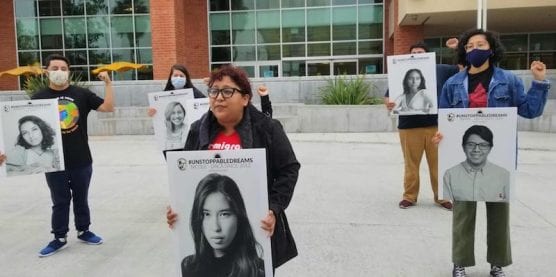By Tim Ryan and Jack Rodgers
WASHINGTON (CN) — The Supreme Court blocked President Donald Trump on Thursday from rolling back the program that protects qualifying immigrants from deportation.
Writing for a 5-4 majority, Chief Justice John Roberts found the rescission of the Deferred Action for Childhood Arrivals policy arbitrary and capricious.
“The dispute before the court is not whether DHS may rescind DACA. All parties agree that it may,” Roberts wrote, abbreviating both the name of the policy and the Department of Homeland Security. “The dispute is instead primarily about the procedure the agency followed in doing so.”
A hallmark of the Obama administration, DACA offers a raft of benefits to people who lacked legal immigration status after entering the United States as children. To qualify, applicants need to have to come to the United States before turning 16, stayed here continuously and maintained a clean criminal record. Applicants also must show they were either in school, graduated, obtained an equivalent degree, or served in the military.
Since its creation in 2012, nearly 700,000 people were participating in the program as of September 2017.
Hopeful that the court would rule this morning, a few of those program recipients gathered Thursday at the California State University, Los Angeles, clutching phones that soon chirped with notifications and messages from family, friends and press.
“I feel that this is what we fought for and what we deserve,” Melody Klingenfuss, a 26-year-old DACA recipient told Courthouse News while reading the decision through a cloth mask.
Klingenfuss arrived in the United States at age 9 from Guatemala and says the weight of her undocumented status really hit her when she was applying for colleges. She earned a master’s degree from the University of Southern California and now works as an organizer with the nonprofit Coalition for Humane Immigrant Rights.
“I feel content we got as much of a positive decision … but we’re getting the bare minimum,” Klingenfuss said. “Like, yay? There’s still work to be done.
“Going after the DACA folks is exactly what [Trump’s] people and his supporters expect of him,” she added. “By not having this win we understand sends a message that everything he has done is wrong, is immoral and has been inhumane.”
In Washington, however, the majority could not credit the allegations that the Trump administration’s prejudices against immigrants motivated its termination of a policy, given that 78% of DACA recipients are Latinos from Mexico.
“Because Latinos make up a large share of the unauthorized alien population, one would expect them to make up an outsized share of recipients of any cross-cutting immigration relief program,” Roberts wrote.
As for the various insults Trump lobbed at Latinos both before and after his election, Roberts called such statements “unilluminating.”
“Even as interpreted by respondents, these statements — remote in time and made in unrelated contexts — do not qualify as ‘contemporary statements’ probative of the decision at issue,” Roberts wrote.
Justice Sonia Sotomayor joined all but this section of the opinion, tackling the issue of equal protection separately in a partial dissent.
Saying the court was remiss to ignore Trump’s campaign statements, she emphasized that unlawful immigration from Mexico has been “a keystone of President Trump’s campaign and a policy priority of his administration.”
Trump responded to the ruling with a tweet referencing other losses his administration has suffered at the court.
“Do you get the impression that the Supreme Court doesn’t like me?” Trump wrote.
Sotomayor called the decision to terminate DACA without considering the consequences suggestive of the administration’s motives.
“The abrupt change in position plausibly suggests that something other than questions about the legality of DACA motivated the rescission decision,” she wrote.
But DACA was not created through legislation, despite efforts from the Obama administration to get the policy through Congress. Instead, the administration created the program as a form of prosecutorial discretion. The Fifth Circuit blocked an expansion of the program known as Deferred Action for Parents of Americans and Lawful Permanent Residents from taking effect.
Conservatives have long attacked DACA as an executive overreach, and it was on this basis that the Trump administration rescinded the policy in 2017, following threats from Texas and other states to challenge the legality of DACA in court.
Trump then used the program as a bargaining chip in seeking funding for his long-promised border wall.
Rescinding the program brought a flood of lawsuits from blue states and immigrant and civil rights groups, who argued the move threw the statuses of hundreds of thousands of people who relied on the program to build their lives into doubt. The groups and states also argued the Trump administration did not follow procedures required under the Administrative Procedure Act in revoking the program.
The challengers said the administration did not consider how rescinding the program would hurt the people who had come to rely on it, and that it ignored past government guidance finding DACA lawful.
Andrea Flores, the deputy director of immigration policy at the ACLU, praised the decision but called on the Senate to take up House-passed legislation that would codify DACA.
“This decision allows DACA recipients to live and work without the daily fear of deportation and confirms what we have always known: America is their home,” Flores said in a statement.
Procedural issues, including those with the Administrative Procedure Act, are a primary focus of Thursday’s ruling, which Justices Ruth Bader Ginsburg, Stephen Breyer and Elena Kagan joined in full.
While the government argued the decision to rescind DACA was judicially unreviewable, the court considered that the policy was more than one of nonenforcement, and that the administration failed to show it had acted with careful consideration.
Indeed, former Homeland Security Secretary Kristjen Nielsen refused to elaborate on the reasons for rescinding the program given by her predecessor, Secretary Elaine Duke — a position that the court said boxed her into relying on only that argument.
“But despite purporting to explain the Duke memorandum, Secretary Nielsen’s reasoning bears little relationship to that of her predecessor,” Roberts wrote. “Acting Secretary Duke rested the rescission on the conclusion that DACA is unlawful. Period. By contrast, Secretary Nielsen’s new memorandum offered three ‘separate and independently sufficient reasons’ for the rescission, on the first of which is the conclusion that DACA is illegal.”
Roberts expanded on this later. “An agency must defend its actions based on the reasons it gave when it acted,” he wrote. “This is not the case for cutting corners to allow DHS to rely upon reasons absent from its original decision.”
Before the Supreme Court took up the case, a federal court in California had enjoined the rollback, and the Ninth Circuit affirmed. Courts in New York and Washington, D.C., also found the Trump administration had overstepped, while a court in Maryland sided with the administration.
New York Attorney General Letitia James, whose office helped lead a coalition of states challenging the DACA winddown, said the decision is the culmination of a hard-fought legal struggle.
“The Supreme Court’s decision today sets aside an inhumane injustice by the Trump administration and permits young people who go to school here, who work here, who pay taxes here, who raise families here, and who are vital members of our communities to continue to be able to live in their homes without fear of arrest or deportation,” James said in a statement. “America is a country of immigrants; our culture made richer by their contributions and our economy made more prosperous because of their work.”
Gibson Dunn attorney Theodore Olson, representing those individuals and private companies who brought suits to preserve DACA, said the court’s decision is critical to people who have built lives based on its protections.
“DACA has brought stability, predictability and dignity to the lives of hundreds of thousands of people,” Olson said in a statement. “It has allowed them to work, build small businesses, support their families, further their educations, serve in the military and contribute to their communities and to the economy of the only place most of them have ever called home.”
Justices Brett Kavanaugh and Samuel Alito each included partial dissents while also signing onto to a partial dissent from Justice Clarence Thomas, who accused the majority of mounting “an effort to avoid a politically controversial but legally correct decision.”
“The court could have made clear that the solution respondents seek must come from the Legislative Branch,” Thomas wrote. “Instead, the majority has decided to prolong DHS’ initial overreach by providing a stopgap measure of its own. In doing so, it has given the green light for future political battles to be fought in this court rather than where they rightfully belong — the political branches.”
Thomas also took issue with the majority’s focus on the degree to which Homeland Security discussed the benefits DACA provides as well as forbearance from removal — “even though no such detailed discussion accompanied DACA’s issuance.”
“The majority’s demand for such an explanation here simply makes little sense,” he added.
Thomas called it “more than sufficient” that Homeland Security determined that DACA was ultra vires, a legal term from Latin that describes an action made without requisite legal authority.
“By requiring more, the majority has distorted the APA review process beyond recognition, further burdening all future attempts to rescind unlawful programs,” Thomas wrote, abbreviating the Administrative Procedure Act.
Officials from the Department of Homeland Security did not immediately respond to requests for comment Thursday.
For students like Gabriel Tarango-Gonzales, a 29-year-old business administration major at California State University, Los Angeles, the ruling would need time to sink in.
“We’re still not finished, we still have to advocate for the ones who are left behind,” Tarango-Gonzales said. “We know it’s not the end, but it’s a positive outcome to move in unity to help all our community for their rights.”
Courthouse News reporter Nathan Solis contributed reporting from Los Angeles
To view the Department of Homeland Security v. Regents of Univ. of Cal. case (06/18/2020), see below:
[Open .pdf in new window]
Like this:
Like Loading...
Related





 Tweet This
Tweet This Facebook
Facebook Digg This
Digg This Bookmark
Bookmark Stumble
Stumble RSS
RSS


























REAL NAMES ONLY: All posters must use their real individual or business name. This applies equally to Twitter account holders who use a nickname.
0 Comments
You can be the first one to leave a comment.